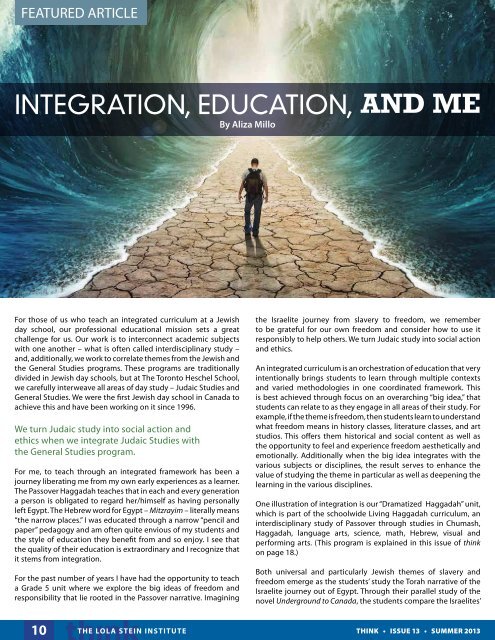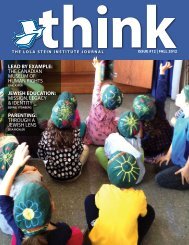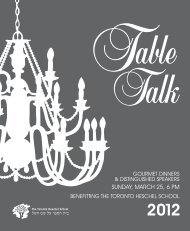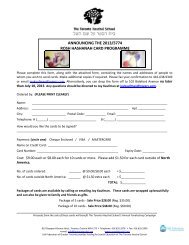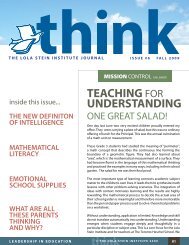Issue No. 13 - The Toronto Heschel School
Issue No. 13 - The Toronto Heschel School
Issue No. 13 - The Toronto Heschel School
Create successful ePaper yourself
Turn your PDF publications into a flip-book with our unique Google optimized e-Paper software.
FEATURED ARTICLE<br />
INTEGRATION, EDUCATION, AND ME<br />
By Aliza Millo<br />
Exodus to the history of the Underground Railway that brought<br />
American slaves to freedom in Canada. <strong>The</strong>y discover similar<br />
themes and tensions and create a dramatic presentation. <strong>The</strong> unit<br />
culminates in a Hebrew performance for which students write<br />
the script, build the sets, compose the music, and choreograph<br />
a complex presentation that demonstrates all of the learning<br />
they experienced in this unit. <strong>The</strong>y present it to their parents and<br />
school community.<br />
Having taught the Dramatized Hagaddah as an English Language<br />
Arts teacher, a Hebrew language teacher, and a teacher of<br />
Chumash, I can attest to the educational advantages of teaching<br />
this material as an integrated unit. Each component is completed<br />
as a rigorous Grade 5 academic exercise and the combustion when<br />
the units are combined is fascinating to see.<br />
NEWS 20<strong>13</strong><br />
When we integrate Judaic Studies with General Studies, we add<br />
credence and value to the Jewish learning in the eyes of our<br />
young Canadians. <strong>The</strong>y come to experience their Jewish learning<br />
and knowledge as an intrinsic part of their day, in stride with and<br />
not isolated from the wider world of learning. When they see that<br />
Jewish values are inherent in universal values and reciprocally that<br />
universal values are reflected in Jewish traditions, our students<br />
begin to see their whole world fit together; both authenticity and<br />
relevance are part of their education.<br />
When we integrate Judaic Studies with General Studies,<br />
MARCH<br />
Publication of “Jewish Education, Democracy and<br />
Pluralistic Engagement,” a chapter by Greg Beiles<br />
in Discipline, Devotion, and Dissent: Jewish, Catholic,<br />
and Islamic <strong>School</strong>ing in Canada, eds. McDonough,<br />
Memon and Mintz,<br />
http://www.wlupress.wlu.ca/Catalog/mcdonoughdiscipline.shtml<br />
For those of us who teach an integrated curriculum at a Jewish<br />
day school, our professional educational mission sets a great<br />
challenge for us. Our work is to interconnect academic subjects<br />
with one another – what is often called interdisciplinary study –<br />
and, additionally, we work to correlate themes from the Jewish and<br />
the General Studies programs. <strong>The</strong>se programs are traditionally<br />
divided in Jewish day schools, but at <strong>The</strong> <strong>Toronto</strong> <strong>Heschel</strong> <strong>School</strong>,<br />
we carefully interweave all areas of day study – Judaic Studies and<br />
General Studies. We were the first Jewish day school in Canada to<br />
achieve this and have been working on it since 1996.<br />
We turn Judaic study into social action and<br />
ethics when we integrate Judaic Studies with<br />
the General Studies program.<br />
For me, to teach through an integrated framework has been a<br />
journey liberating me from my own early experiences as a learner.<br />
<strong>The</strong> Passover Haggadah teaches that in each and every generation<br />
a person is obligated to regard her/himself as having personally<br />
left Egypt. <strong>The</strong> Hebrew word for Egypt – Mitzrayim – literally means<br />
“the narrow places.” I was educated through a narrow “pencil and<br />
paper” pedagogy and am often quite envious of my students and<br />
the style of education they benefit from and so enjoy. I see that<br />
the quality of their education is extraordinary and I recognize that<br />
it stems from integration.<br />
For the past number of years I have had the opportunity to teach<br />
a Grade 5 unit where we explore the big ideas of freedom and<br />
responsibility that lie rooted in the Passover narrative. Imagining<br />
the Israelite journey from slavery to freedom, we remember<br />
to be grateful for our own freedom and consider how to use it<br />
responsibly to help others. We turn Judaic study into social action<br />
and ethics.<br />
An integrated curriculum is an orchestration of education that very<br />
intentionally brings students to learn through multiple contexts<br />
and varied methodologies in one coordinated framework. This<br />
is best achieved through focus on an overarching “big idea,” that<br />
students can relate to as they engage in all areas of their study. For<br />
example, if the theme is freedom, then students learn to understand<br />
what freedom means in history classes, literature classes, and art<br />
studios. This offers them historical and social content as well as<br />
the opportunity to feel and experience freedom aesthetically and<br />
emotionally. Additionally when the big idea integrates with the<br />
various subjects or disciplines, the result serves to enhance the<br />
value of studying the theme in particular as well as deepening the<br />
learning in the various disciplines.<br />
One illustration of integration is our “Dramatized Haggadah” unit,<br />
which is part of the schoolwide Living Haggadah curriculum, an<br />
interdisciplinary study of Passover through studies in Chumash,<br />
Haggadah, language arts, science, math, Hebrew, visual and<br />
performing arts. (This program is explained in this issue of think<br />
on page 18.)<br />
Both universal and particularly Jewish themes of slavery and<br />
freedom emerge as the students’ study the Torah narrative of the<br />
Israelite journey out of Egypt. Through their parallel study of the<br />
novel Underground to Canada, the students compare the Israelites’<br />
Executing large-scale project-based learning such as the<br />
Dramatized Haggadah is a wonderful way to knit various academic<br />
“pieces” of a unit together. It also instills tremendous camaraderie<br />
and unity in a group of students, which is especially important as<br />
they head for junior high. At our school, the Dramatized Haggadah<br />
is a major “coming of age” event for the students. It helps create<br />
a community of learners where students are encouraged to<br />
succeed and simultaneously motivated to support and encourage<br />
one another cooperatively as a team. Learning as a community<br />
enables students of all talents to work together and it showcases<br />
their strengths and skills.<br />
Our obligation to regard ourselves as though we left Egypt helps<br />
us appreciate our freedom, one that comes with responsibility.<br />
Having experienced my own journey from “slavery to freedom” as<br />
a learner and educator, I am reminded of this and it empowers<br />
me. As an educator today, I have long left the Mitzrayim education<br />
world to which I once belonged. I have learned that students are<br />
best educated in an integrated environment that sees the value in<br />
both individual learning and community collaboration.<br />
Yes, I am no longer in Egypt. <strong>No</strong>netheless, it remains my<br />
responsibility to remind myself from where I came; doing so will<br />
help me continue to educate my students in the way that I am<br />
certain they learn best.<br />
Aliza Millo, is from Winnipeg. After completing a B.A. from the<br />
University of Manitoba, she received a Specialized Honours Arts<br />
Degree and Bachelor of Education Degree from York University.<br />
Aliza has taught at <strong>The</strong> <strong>Toronto</strong> <strong>Heschel</strong> <strong>School</strong> for five years, in<br />
Grades 4 through 7.<br />
JUNE<br />
“<strong>The</strong> Parent Child Relationship as a Paradigm for<br />
Teaching and Learning,” a presentation by Greg Beiles<br />
at the Network for Research in Jewish Education<br />
Conference, New York.<br />
SEPTEMBER<br />
Shalom Hartman Institute Senior Educators Forum, in<br />
<strong>Toronto</strong><br />
Lola Stein hosts 4th year of professional development.<br />
<strong>The</strong>me: “People of the Body: Embodied Jewish Ethics.”<br />
OCTOBER<br />
<strong>The</strong> Renaissance Child:<br />
A Colloquium in <strong>Toronto</strong> on Jewish Education.<br />
Scholars include Prof. Martin Lockshin,York University;<br />
Prof. Mark Meyerson, University of <strong>Toronto</strong>; Dr. Yehuda<br />
Kurtzer, Shalom Hartman Institute <strong>No</strong>rth America; Prof.<br />
Melissa Shiff, University of <strong>Toronto</strong>.<br />
10 think • issue <strong>13</strong> • SUMMER 20<strong>13</strong><br />
11


